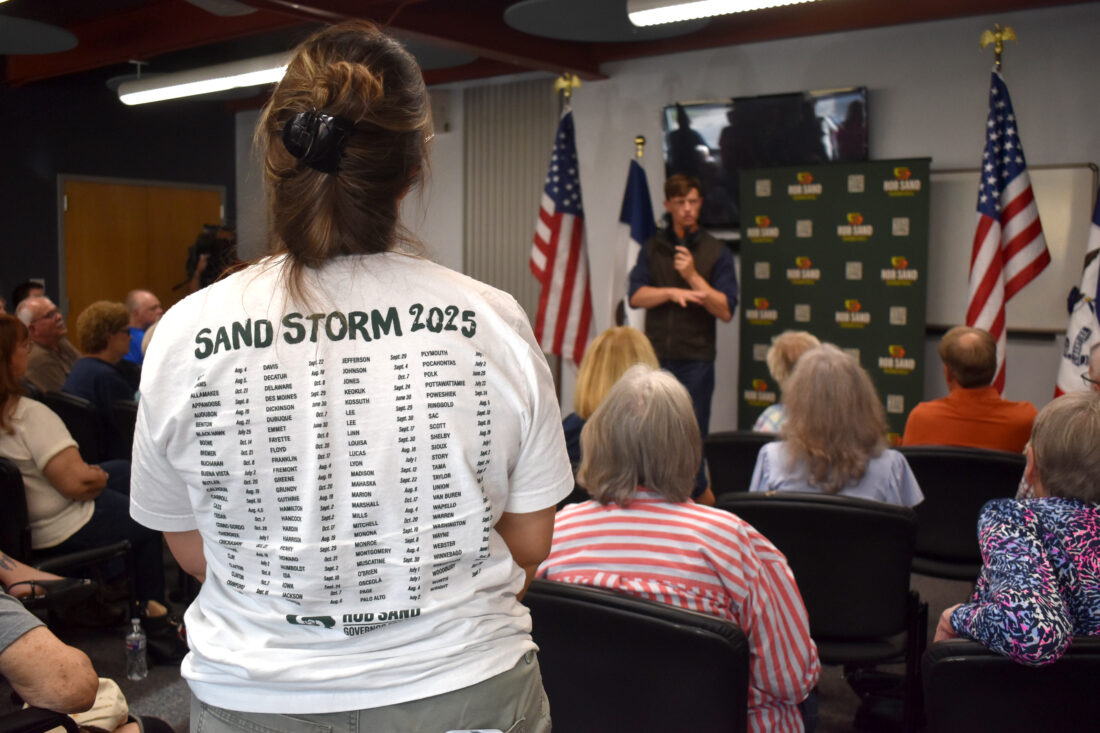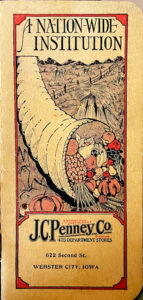Sand brings the conversation to Webster City
"What do I want to do? Make Thanksgiving fun again."

Daily Freeman-Journal photo by Jane Curtis: The back of a Rob Sand staffer's t-shirt maps out his 100 county seat tour, which stopped in Webster City Tuesday at Fuller Hall. Sand, Iowa's state auditor and a Democrat, is running for governor to fill the seat of Republican Gov. Kim Reynolds. Reynolds announced earlier this year that she will not seek another term.
Late into his town hall in Webster City Tuesday, Rob Sand asked for questions and got one from Denise Gajewsky of Jewell.
“What happened to the AEAs?”
A veteran of both Heartland and Prairie Lakes Area Education Agencies, Gajewsky is a Licensed Independent Social Worker. Though she officially retired in 2018, she still works part-time for AEAs. In that time, she said, she has both experienced a system that worked and witnessed the results of legislation passed in 2024 that changed how AEA services are delivered to students, both with and without disabilities.
“We lost a lot of professionals from our state,” Gajewsky said. “They moved their families to another state.”
Her question struck a nerve.
“I have done over 740 public town halls with advanced notice in all 100 county seats in the state of Iowa,” Sand responded. “In over 700 of these town halls, never once did someone say to me, I have a mild complaint about the AEAs. I have a slight concern about the AEAs. Nobody, not ever, not once. And I think I know why: because they worked.
“My mom was an AEA employee for 20 years,” Sand elaborated. Then he described witnessing her commitment in the area she served — northeast Iowa.
“Oh, I remember the day when she finally got that car phone with a giant magnet on top of the car. And we all went, thank goodness. Because she’d be out driving in January. … We wouldn’t know, if she was home late, it’s because she’s in the ditch. Because she was doing home visits. She was going to the homes of some of the kids and the families that have been dealt some of the toughest hands that you could be dealt.
“But there were days where she would come home. Cloud nine, my kid began to walk today. It was the same sense of pride that she would have had if it was me or my sister. She would love those kids, but she worked so hard for them.
“You had an experience with this?” he asked Gajewsky. “What was yours?”
“Thirty-five years school social worker.”
By now, Sand had grasped Gajewsky’s hand. He said, “Thank you for doing that work.”
Then he continued, “All those systems that are broken. Who is this supposed to serve? Again, I go back to where we started. In Des Moines, they are focused on insiders and special interest groups. Ideology is a piece of that. Oh, we don’t want the state doing this. The private market can do it. Well, you know, we tried to have the private market doing it, and the market failed, and that’s why the AEAs got created.”
Sand, a Democrat who wants to be Iowa’s next governor when Republican Gov. Kim Reynolds steps down, drilled home a point he made repeatedly during the hour in the Sampson Room at Fuller Hall.
“The ADAs were the model for how to give kids in rural areas and small towns the level of services that they could get in big cities. And we went and broke it for what? For what? I’m still asking that question, honestly. Because she wanted to, because they could. Because they could. That’s not public service, it’s politics.”
Sand, Iowa’s state auditor, was born and raised in Decorah. His post-secondary education is from Brown University and the University of Iowa College of Law. At Iowa, he was both president of the Iowa Student Bar Association and an editor-in-chief of a law journal, according to his public biography. But he harkens back to a local skate park initiative during his years at Decorah High School to illustrate what collaborative work and persistence can accomplish.
Sand applies that idealism to his campaign.
“What do we do when people don’t want to listen to us?” he asked, then gestured around the packed space. “This. This is what we do. We get together in a room. It isn’t just people in one party. It’s not about Democrats versus Republicans, it’s not redder or bluer, it’s better and truer.”
Instead of a question, Cherie Hill, who lives near Ellsworth, told Sand there was no doubt he would be elected. But it would come with a price.
“You’re coming in hot,” she said.
Later, she elaborated. “Once he gets elected, he’s coming in hot because of how Iowa is. I mean, we heard questions on the teachers. We heard AEA, we heard small business, and my thing is farming. My children are teachers, so of course the IPERS is an issue too, and Social Security, but Iowa is a rural farming community, and there are lots of farmers that are in trouble, financial trouble.”
She added, “It’ll be like the 80s. My husband farmed and we’d built a new house in the late 70s and then farming went the way it was and I was not working. I was home with kids and I went to work and I just retired three years ago and I’m 73, so that’s how long I worked and we saved our farm.”
Hill said she did clerical work for Iowa State University.
“Farmers are overextended because they’ve bought land when it was $18, $19,000 an acre and paying $400,000 for machinery and now corn is under $4,” she said. “My husband rents his ground out and we just hope that the young guys that are renting our farm out will be able to make it.”
One by one, the worries were named.
“Can we work towards getting term limits? Chuck Grassley has been in office since before I graduated high school. Isn’t it time to end it?” asked a man who looked to be in his 60s.
“I work at our local hospital and rural health clinic. That big bill that was passed in Washington, D.C., has the potential to really damage Iowa’s access to health care and our most vulnerable, and our rural communities are already struggling to get everybody’s health care they need. What can we do?”
Sand responded: “Great question. You can contact your federal representatives and tell them, I’m frustrated with this bill, please stop.”
The questioner said, “They don’t care.”
Sand agreed. “No, you’re right. You have called, haven’t you?”
Another woman jumped in. “I have emailed. I have called.”
Sand said, “Okay, then let me make a suggestion, because there’s some people who do the five calls thing. Can you do the five calls thing?”
“Yes, I do.”
“Take five calls, and instead of doing five calls every day to your representatives, do it to a neighbor that you don’t know very well,” Sand suggested. “I’m deadly earnest about this. Somebody that you are pretty sure doesn’t always vote the way you vote. You just pick five of them. You say, hey, I’m calling because I’m just trying to get to know people better in town, and we’re all feeling a little bit lonely these days. Just talk to them. Ask them questions.
“So when they say that thing you disagree with, ask why do you feel that way? When they answer your question, say tell me more about that. To the answer of that question, hmm, why is that? By the time you get to that third why I can almost promise you they are going to say something that you actually agree with — your neighbor — that you think is so separate from you, that we have been told to think that we should hate.”
Then he said, “Raise your hand if your Thanksgivings have gotten less comfortable over the last decade. Why are we putting up with a political system that does this to our loved ones, to our families?
“What do I want to do? Make Thanksgiving fun again. Make it about gratitude. Make it about all the wonderful things that we have in our lives that we get to share with each other. And not about anger, not about politics that seems to consume everything.”


